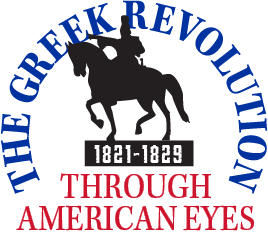I. Aspects of American Philhellenism:
Edward Everett, Thomas Jefferson and Adamantios Korais; Albert Gallatin and The Marquis de Lafayette
A. Letter of John Pickering to Adamantios Korais
(Editor's note: Even before the revolution of 1821, the reputation of Adamantios Korais as a Greek scholar, patriot and writer was known to American academics. The following letter from John Pickering, a linguist from Boston, to Korais, written in February, 1819, demonstrates the high regard and great respect which Korais enjoyed among the academic circles in the United States. The original manuscript in the French language is located in the Korais Library of Chios.)
(Stratakis, pp. 164-65) February 22, 1819
Dear Sir,
Although I do not have the pleasure of knowing you, I am not unaware of your reputa tion, which is not limited to the old continent, and I take the liberty of introducing myself to you as a passionated [sic] admirer of your language, as well as of everything that concerns your interesting country, in order to offer you a Memoir for Modern Greek Pronunciation, which I would like to make known to my compatriots.
Although convinced that the infinite number of faults which have escaped me will not fail to be apparent to the eyes of a Greek scholar, I flatter myself, however, that this small work will find the welcome which it can only hope to find from a truly erudite person, who will amuse himself by seeking therein some merit rather than stopping with criticizing its faults. I dare to hope, Sir, that you will deign to advise me of the major faults which instead of assisting might harm the cause of Greek literature which I cherish with so much zeal. I do not doubt either that you will note that eve rything that I know concerning modern Greek pronunciation has been communicated to me solely by Peloponnesian Greeks, whose pronunciation may be somewhat different from that of other parts of Greece; and you will permit me to point out, in particular, the sound of the lambda and of the nu when they are followed by the eta, iota, etc., which these Greeks have assured me are pronunced [sic] by everyone in Greece like the gl of the Italians; which pronunciation (as I find) has not been indicated either by the writers of the past centuries nor by the travelers of our day whom I have been able to consult in this country.
Desiring to perfect myself in the Greek language, both ancient and modern, I take the liberty of asking you, Sir, to do me a great favor, namely to indicate to me where I could find a collection of the works which you have published for the use of your compatriots, and to have the kindness of sending a catalog ue thereof to my friends Messrs. Welles and Williams, bankers of Paris, who will procure them for me.
I have the honor to be, sir,
Your very humble and obedient servant,
John Pickering
in Salem, near Boston, United States
February 22, 1819
(Hatzidimitriou Page 1 - 3)
Source: Constantine G. Hatzidimitriou, Founded on Freedom and Virtue: Documents Illustrating the Impact in the United States of the Greek War of Independence, 1821-1829 (New Rochelle, New York: Aristide D. Caratzas, 2002).
